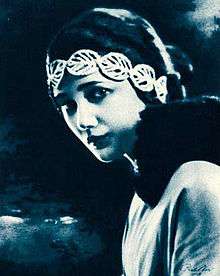Jetta Goudal
| Jetta Goudal | |
|---|---|
 Publicity photo of Goudal from Stars of the Photoplay (1924) | |
| Born |
Julie Henriette Goudeket July 12, 1891 Amsterdam, Netherlands |
| Died |
January 14, 1985 (aged 93) Los Angeles, California, U.S. |
| Occupation | Actress |
| Years active | Before 1918–1932 |
| Spouse(s) | Harold Grieve (1930–1985; her death) |
Jetta Goudal (/ˈʒɛtə/; July 12, 1891 – January 14, 1985) was a Dutch-born American actress, successful in Hollywood films of the silent film era.
Early life
Goudal was born as Julie Henriette Goudeket in 1891, the daughter of Geertruida (née Warradijn; 1866–1920) and Wolf Mozes Goudeket (1860–1942), a wealthy diamond cutter, in Amsterdam.[1][2] Her parents were both Jewish, and her father was Orthodox.[3] She had an older sister, Bertha (1888–1945) and a younger brother Willem, who died when he was 4 months old in 1896.
Her father remarried in 1929 to Rosette Citroen (1882–1943)
Tall and regal in appearance, she began her acting career on stage, traveling across Europe with various theater companies.
In 1918, she left World War I-era devastated Europe to settle in New York City in the United States, where she hid her Dutch Jewish ancestry, generally describing herself as a "Parisienne" and on an information sheet for the Paramount Public Department she wrote that she was born at Versailles on July 12, 1901 (shaving 10 years off her age as well), the daughter of a fictional Maurice Guillaume Goudal, a lawyer.[1][4]
Career
She first appeared on Broadway in 1921, using the stage name Jetta Goudal. After meeting director Sidney Olcott, who encouraged her venture into film acting, she accepted a bit part in his 1922 film production Timothy's Quest. Convinced to move to the West Coast, Goudal appeared in two more Olcott films in the ensuing three years.
Goudal's first role in motion pictures came in The Bright Shawl (1923). She quickly earned praise for her film work, especially for her performance in 1925's Salome of the Tenements, a film based on the Anzia Yezierska novel about life in New York's Jewish Lower East Side. Goudal then worked in the Adolph Zukor and Jesse L. Lasky co-production of The Spaniard and her growing fame brought her to the attention of producer/director Cecil B. DeMille.
Goudal appeared in several highly successful and acclaimed films for DeMille and became one of the top box office draws of the late 1920s.
DeMille later claimed that Goudal was so difficult to work with that he eventually fired her and cancelled their contract. Goudal filed a lawsuit for breach of contract against him and DeMille Pictures Corporation.
Although DeMille claimed her conduct had caused numerous and costly production delays, in a landmark ruling, Goudal won the suit when DeMille was unwilling to provide his studio's financial records to support his claim of financial losses.
Goudal appeared in 1928's The Cardboard Lover, produced by William Randolph Hearst and Marion Davies. In 1929, she starred in Lady of the Pavements, directed by D.W. Griffith, and in 1930, Jacques Feyder directed Goudal in her only French language film, a made-in-Hollywood production titled Le Spectre vert.
Unwilling retirement
Because of her audaciousness in suing DeMille and her high-profile activisim in the Actors' Equity Association campaign for the theatre and film industry to accept a closed shop, some of the Hollywood studios refused to employ Goudal. In 1932, at age forty-one, she made her last screen appearance in a talkie, co-starring with Will Rogers in the Fox Film Corporation production of Business and Pleasure.
In 1930, she married Harold Grieve, an art director and founding member of the Academy of Motion Picture Arts and Sciences. When her film career ended, she joined Grieve in running a successful interior design business. They remained married until her death in 1985 in Los Angeles.[5] She is interred next to her husband in a private room at the Great Mausoleum, Sanctuary of the Angels, at Forest Lawn Memorial Park Cemetery in Glendale, California.
In 1960, for recognition of Goudal's contribution to the motion picture industry, she was honored with a star on the Hollywood Walk of Fame at 6333 Hollywood Blvd.
Holocaust
Jetta Goudal lost nearly all her relatives in the holocaust. Her Sister Bertha died in 1945 in Bergen-Belsen concentration camp, Bertha's husband Nathan Beffie died at the same place in 1944. Jetta's nephew Eduard Beffie (Berta's son) was killed at Sobibór extermination camp. Jetta Goudals stepmother, Rosette Citroen, was also killed at Sobibor in 1943. Only Bertha's daughter, Geertruida (Truus) Beffie survived the war and died in 2013 in Pennsylvania, United States.
Filmography
- Timothy's Quest (1922)
- The Bright Shawl (1923)
- The Green Goddess (1923)
- Open All Night (1924)
- The Spaniard (1925)
- Salome of the Tenements (1925)
- The Coming of Amos (1925)
- The Road to Yesterday (1925)
- Three Faces East (1926)
- Paris at Midnight (1926)
- Her Man o' War (1926)
- Fighting Love (1927)
- White Gold (1927)
- The Forbidden Woman (1927)
- The Cardboard Lover (1928)
- Lady of the Pavements (1929)
- Le Spectre vert (1930)
- Business and Pleasure (1932)
References
- 1 2 Slide, Anthony. Silent Players:A Biographical and Autobiographical Study of 100 Silent Film Actors and Actresses. University Press of Kentucky, 2002. ISBN 0-8131-2249-X. page 146.
- ↑ Information at classicimages.com
- ↑ http://www.genealogieonline.nl/stamboom-van-emden-culemborg/I1456.php
- ↑ Benham, Charles C. "JETTA GOUDAL: The Exotic" at www.classicimages.com (September 1999)
- ↑ "Silent Film Actress Jetta Goudal Dies." Los Angeles Times. January 16, 1985, Page OC13.
External links
| Wikimedia Commons has media related to Jetta Goudal. |
- Works by or about Jetta Goudal at Internet Archive
- Jetta Goudal on IMDb
- Jetta Goudal at AllMovie
- Jetta Goudal at Virtual History
- PicturePlay magazine, January 1927(archived)